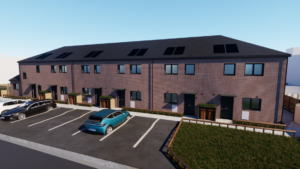Leadership Spotlight: Mervyn Jones, chief executive, Yorkshire Housing
 Yorkshire Housing is a housing association who own and manage around 18,000 properties across Yorkshire.
Yorkshire Housing is a housing association who own and manage around 18,000 properties across Yorkshire.
NewStart spoke to their chief executive, Mervyn Jones, about how to rebalance the housing market, the ‘slow-motion car crash’ of Universal Credit and why he’s still optimistic for the future of social housing.
How does Yorkshire Housing obtain land?
We largely operate by buying land from the private sector. Like many other developing associations, we’re stepping up these programmes and buying bigger parcels of land to sell more housing, which we use to cross-subsidise housing for rent. That’s the business model for most mainstream housing associations now.
Like a lot of developers, housing associations get really fed up with the pace of planning. Local Authorities are strapped for cash, so you might be talking to a planner who only works two or three days a week, has a massive workload, and hasn’t got the time to deal with queries and issues on sites. That slows everything down.
How would you like to see the planning process change?
Local authorities need more resources. They can’t cope. To meet the Government’s ambition of building 300,000 nationally, they are going to need more money just to process that.
We’re still dealing with an almost embedded nimbyism that says development has to be justified, rather than starting with the point of view that people need homes to live in.
It’s a long and difficult process on most sites, especially in the places with the highest housing pressure, those two things go together.
How do you persuade the big developers to include more affordable homes in their schemes?
It’s largely around the section 109 agreement, and how good the planning teams are at negotiating the right deal.
There are some reasonable deals being done in south Leeds, an area with a lower land value than other parts of the city, but you don’t want to introduce large concentrations of social housing.
Social housing is needed in the areas where the value of houses is already high and jobs are accessible, but most of the housing in these places just isn’t available to people on a lower income.
I would say Leeds does really well because it’s an attractive city to build in, but there needs to be more of a spread of affordable and social housing across the city, and not just in those areas where its easier to get hold of land, like Holbeck and other places.
The lessons of all the work we did in the 90s and 00s is you need to have a good mix of housing and provision.
Just piling in more social housing because the land is cheap is not a good idea, you get too much concentration of poverty. As poverty and polarisation increases, you’re asking for trouble.
It was recently reported that 674 bids were made on one council home in Leeds. What does that say about housing in the city?
There are pockets in Leeds with huge demand and other areas where the demand is much more modest.
It’s now recognised across the whole political spectrum that we need to subsidise housing for people on the lowest incomes and who will never buy. That sticks in the throat of some Tories.
Unless Brexit brings a bonanza of high paid high skilled jobs, there’s going to be a lot of people on stagnant wages. They’re not going to be house buyers, even in a benign housing market.
You have to have a subsidised rental market for people who want to work, get on in life, have families and so on, but are never going to buy.
How will Universal Credit affect your tenants?
Universal Credit has been a slow-motion car crash. We have to do a lot of preemptive work around tenants income and Universal Credit as a system.
We’re fearful that when Universal Credit takes hold over our tenant base, it will be a significant drag on our income and their livelihoods.
What are your thoughts on the £200m Voluntary Right to Buy pilot underway in the West Midlands
It’s a programme that Government can’t afford.
When the scheme was first mooted we worked out the figures from our stock and they were fairly neutral.
We’re not over exercised by it, because the numbers will be small anyway if it were to be introduced wholesale.
A lot of people would like to do it, but when they look at a mortgage with rising interest rates, they might not be so keen. So we don’t lose any sleep on it.
Has the Grenfell disaster changed attitudes towards social housing in Government?
We’ve seen a dramatic change of rhetoric.
As horrible as it was, it’s raised the profile of how vital health and safety is for tenants. Every landlord takes a risk, but the more you can do to minimise risk and put proper health and safety in the better.
Grenfell has changed the narrative completely.
The Government has realised that the beating up of stereotypes [of social tenants] in the right-wing press is counterproductive. It’s not reality and it just feeds prejudices that don’t help the housing crisis.
Earlier this year a documentary series about Yorkshire Housing was broadcast on Channel 5. Was this to help reduce the stigma of social housing?
Yes, we were approached and liked the look of the production company. Their values and ethics were good and they do try to show public services in an honest way. They’re not trying to peddle ‘poverty porn’ or horrify their viewers. They are trying to show things as they really are.
It was a calculated gamble and it just about paid off. The conflicts and the tensions of everyday life for people with real financial problems came through.
We might do another one!
Are you optimistic about the future of social housing?
From a housing association perspective, Government has got the message that the housing market is broken.
Every party is now looking at it creatively. How do you create low cost, high quality, safe and affordable housing?
Also, there is now a serious discussion about how do we tax land value. A small number of people have got very rich very quickly through land ownership.
We’re coming back to a great new consensus around housing that we haven’t had for a long time.















